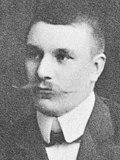| | First party | Second party | Third party |
|---|
| |  | | | | Leader | Edvard Valpas-Hänninen | | |
|---|
| Party | SDP | Finnish | Young Finnish |
|---|
| Last election | 38.40%, 83 seats | 25.44%, 55 seats | 14.23%, 26 seats |
|---|
| Seats won | 84 | 48 | 29 |
|---|
| Seat change |  1 1 |  7 7 |  3 3 |
|---|
| Popular vote | 337,685 | 199,920 | 122,770 |
|---|
| Percentage | 39.89% | 23.62% | 14.50% |
|---|
| Swing |  1.49pp 1.49pp |  1.82pp 1.82pp |  0.27pp 0.27pp |
|---|
| | | Fourth party | Fifth party | Sixth party |
|---|
| |  |  |  | | Leader | Axel Lille | Otto Karhi | Antti Kaarne |
|---|
| Party | RKP | Agrarian | SKrTL |
|---|
| Last election | 12.74%, 24 seats | 6.31%, 10 seats | 2.33%, 2 seats |
|---|
| Seats won | 25 | 13 | 1 |
|---|
| Seat change |  1 1 |  3 3 |  1 1 |
|---|
| Popular vote | 104,191 | 56,943 | 23,259 |
|---|
| Percentage | 12.31% | 6.73% | 2.75% |
|---|
| Swing |  0.43pp 0.43pp |  0.34pp 0.34pp |  0.42pp 0.42pp |
|---|
|
|


